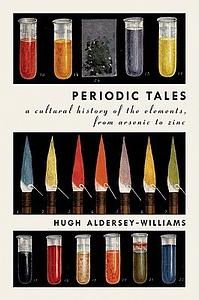Take a photo of a barcode or cover
marcnash21stc's review against another edition
3.0
It's pitched not as an academic tome, nor even a comprehensive study, but more of a fun and slightly off-kilter look at the elements. Williams considers the weight that each element has in our culture, such as lead being associated with death (lining of sarcophagi), leaden skies and gravity itself. He looks at where their names originated from, those metals known to the Ancient civilisations having counter-intuitive letter symbols, because they drew on their Latin or Greek names; stannum meaning tin's symbol is SN, aurus for gold's AU. Then there are those elements discovered (or maybe uncovered would be more accurate, originating largely from mined ores and isolated) between the seventeenth and nineteenth centuries and the surprisingly central role that Swedish scientists had in this. And their diffidence in claiming credit for their finds, unlike the contests between French and British scientists. Cobalt was named after 'kobald', the mythical German miners.
The book is full of etymological gems like this. But I was uncertain as to whether every element was covered. Several were named in passing but not elaborated on, which I found disappointing. The organisation of the elements is not by their group on the Periodic Table, but the author's fanciful labels of "Power", "Fire", "Craft", "Beauty" and "Earth". This lends to the subjective feel throughout the book, so either you buy into the author's perspective the subject as a whole and his take on certain elements individually, or you don't. He starts off with offering testimony to his youthful quest to collect samples of each element, but this enthusiasm somehow fails to be transmitted by the adult him even when he makes pilgrimage to sites where elements were discovered. Many of the sites bear no memorial to their historical importance and have slipped from collective memory. Including the Swedish Ytterby mine where six elements emerged from.
For me there were tantalising gobbets of information here, including the treatment of how elements give off different colours under a spectroscope and where the word 'limelight' comes from. But ultimately I felt frustrated, left with the compound ore rather than being able to bear down on the individual elemental knowledge within. The final chapter sees Williams asking a German scientist why they bother synthesising new elements with half-lives so brief, that the elements cannot be used for anything before they decay and disappear. The scientist gives him an answer that I found as unsatisfying as Williams' own attempts to justify his quest
The book is full of etymological gems like this. But I was uncertain as to whether every element was covered. Several were named in passing but not elaborated on, which I found disappointing. The organisation of the elements is not by their group on the Periodic Table, but the author's fanciful labels of "Power", "Fire", "Craft", "Beauty" and "Earth". This lends to the subjective feel throughout the book, so either you buy into the author's perspective the subject as a whole and his take on certain elements individually, or you don't. He starts off with offering testimony to his youthful quest to collect samples of each element, but this enthusiasm somehow fails to be transmitted by the adult him even when he makes pilgrimage to sites where elements were discovered. Many of the sites bear no memorial to their historical importance and have slipped from collective memory. Including the Swedish Ytterby mine where six elements emerged from.
For me there were tantalising gobbets of information here, including the treatment of how elements give off different colours under a spectroscope and where the word 'limelight' comes from. But ultimately I felt frustrated, left with the compound ore rather than being able to bear down on the individual elemental knowledge within. The final chapter sees Williams asking a German scientist why they bother synthesising new elements with half-lives so brief, that the elements cannot be used for anything before they decay and disappear. The scientist gives him an answer that I found as unsatisfying as Williams' own attempts to justify his quest
halfmanhalfbook's review against another edition
4.0
For all those that avoided chemistry at school this is the book for you! Aldersey-Williams writes about the discovery, history and the uses of the elements that go to make up every thing that you use and touch. Fascinating and written with a light touch for all non-scientists.
lydiathetattooedlady's review against another edition
2.0
This subject matter in the right hands would be entertaining, thought provoking, topical, political, disturbing, shocking... Yeah, this is none of those. Add to that, badly researched (as an FYI to the author, Agatha Christie didn't study poisons to become an author, she didn't need to "show off her research", she learned about poisons during her work in WW1 as a nurse/pharmacy assistant). Ffs, that's basic, first-link-on-Google level research. This is actually a standard example to expect from the book. Lots of personal anecdotes that peter to nothing: "I wrote to this famous male scientist. He didn't reply", and so on.
Hugely disappointing.
Hugely disappointing.
theriojasaurus's review against another edition
adventurous
funny
inspiring
lighthearted
reflective
medium-paced
4.5
simon_b's review against another edition
4.0
A great look at some of chemistry's forgotten characters and their roles in elemental discovery. Well written, with a good historical and scientific understanding that won't baffle the reader.
bimblinghill's review against another edition
3.0
A nice little stroll through the science and history related to various elements.
sarah_elsewhere's review against another edition
4.0
It's fun, it's educational, and it reads like a collection of (sometimes very) short stories.
dave_peticolas's review against another edition
4.0
An enjoyable tour of the periodic table of elements, focusing on their cultural significance and meanings.
